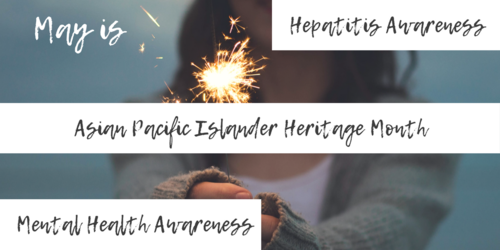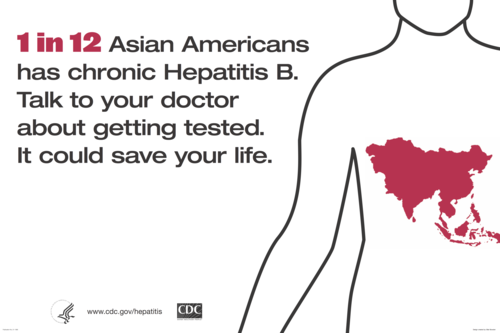Hepatitis Awareness & Mental Health Awareness Month
Image credit: Kristine Alarcon
Image credit: Kristine Alarcon
Many Asian & Pacific Islanders (AAPI) embrace and cultivate their cultures in their daily lives, but May is the month when their culture is shared and celebrated with the rest of the country. And for most college kids in the U.S., May is the mark of the future, when classes end or the hunt for them begin. However, when everyone leads such busy lives, no one thinks enough about maintaining their health. May is AAPI Heritage Month, but it’s also Hepatitis and Mental Health Awareness month.
CDC Know Hepatitis B Campaign
The CDC designated May as Hepatitis Awareness Month in the U.S. to increase awareness of the disease and to make sure that high risk populations are tested during this month. Hepatitis is an inflammation of the liver, which can be caused by a virus, bacteria, a severe physical injury, and harmful drug combinations. It is one of the leading causes of liver cancer, which is statistically high in AAPI communities. Though there are different types of hepatitis viruses, there are 1 in 12 AAPIs that have hepatitis B, and 2 in 3 don’t know that they have it!
There are five types of viral hepatitis:
Hepatitis A is transmitted through water and food.
Hepatitis B is transmitted through infected bodily fluids like sexual fluids and blood. Some examples of transmission are through sexual contact with an infected person, needlestick injuries, contaminated needle or syringe sharing, and exposure during birth from an infected mother.
Hepatitis C has similar modes of transmission to hepatitis B, but a completely different virus causes it. People are exposed to the hepatitis C virus when they are exposed to infected blood, unsterile or contaminated needles, and unprotected sex. Hepatitis C, according to Yip, Dr. Nguyen, & Dr. Nguyen, affects 94.6 million Asian Americans and their prevalence is similar to the rest of the country.
Hepatitis D, or hepatitis delta, is unique in that this virus can only infect people who already have the hepatitis B virus. People who have hepatitis B should be tested for hepatitis D because co-infection with both viruses can severe and rapid liver damage.
Hepatitis E is transmitted through blood products, food, and contaminated water.
It is extremely important that AAPI immigrants and their children get tested for viral hepatitis, especially for hepatitis B. The Western Pacific region of the world (which includes Asian countries) has the highest global prevalence of hepatitis B with a 6.2% prevalence rate. The reason for this could be that one of the most common ways that hepatitis B is transmitted around the world is during childbirth when a chronically infected mother exposes her baby. Some countries around the world, including Asian countries, often do not give babies the first dose of the hepatitis B vaccine within the first 24 hours of life and hepatitis B immune globulin (HBIG) like the World Health Organization recommends. 90% of babies who do not get the birth dose of the hepatitis B vaccine and HBIG develop a life long hepatitis B infection for the rest of their lives. At the same time, people are discouraged from getting tested for hepatitis B because of the discrimination associated with it. Finding out that you have a hepatitis infection could mean losing your job or not being allowed to pursue your dream job in another countries.
Mental Health America
In addition to Hepatitis Awareness Month, May is also dedicated to mental health awareness. There are 1 in 5 Americans who are living with a mental health illness. They often do not speak up about their condition or seek help since there is shame and stigma associated with mental health illnesses. May is an opportunity to start the conversation about mental health, so that people are more comfortable in finding the help they need. For AAPIs, it can be even harder, as they are less likely to admit that they have a mental health illness compared to other ethnic populations. Mental health is not talked about for severals reasons, whether it is the pressure to keep up the model minority stereotype, refusal to trust authorities in refugee populations, or just the plain stubbornness to admit that something is wrong. There is stigma in admitting that mental health illnesses personally affects someone with varying degrees of stigma amongst the diverse AAPI groups, and that needs to change.
According to Office of Minority Health in 2016,
18.9% of Asian American high school students reported they considered suicide compared to the 15.5% of Caucasians
10.8% of Asian American high school students reported having attempted suicide compared to the 6.2% of Caucasians
Suicide death rates are 30% higher for 15-24 year old Asian American females compared to Caucasian females
Suicide death rates for 65+ year old Asian American females are higher than they are for white females
The shame and stigma associated with mental illness as well as the lack of awareness for it are preventing people from seeking help and services. Fortunately, there are so many AAPI advocates for mental health including Anna Akana, Minji Chang (Kollaboration’s former Executive Director), and more, who are keeping the conversation about mental health going and helping to break the stigma.
This month is truly a special month to embrace the past, present, and future. It is a reminder to celebrate AAPI Heritage, to be present and to think about health, and to embrace new beginnings. May is a time to celebrate the unique cultures and traditions of AAPI cultures, but it is also an opportunity to dismantle the stigma associated with diseases and illnesses that disproportionately affect AAPIs. It is a call to generate more conversations about AAPI heritage, hepatitis, and mental health. May is an opportunity for you to become an advocate for your culture and health.
For more information about Hepatitis Awareness Month and hepatitis, visit the CDC website,the Hepatitis B Foundation, and/or SFHepBFree. More information and resources for Mental Health Awareness Month can be found at the National Alliance on Mental Illness website and the National Asian American Pacific Islander Mental Health Association website.




